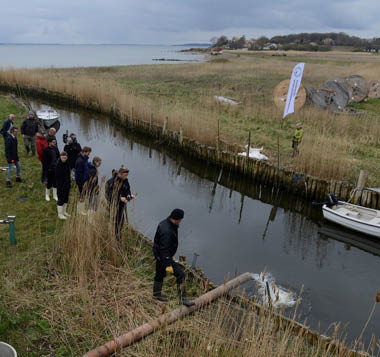Project 'Smolt Guard' aims to motivate anglers all over the country to scare away cormorants and other fish-eating birds when 1.6 million trout smolt are released into the mouths of the Danish streams in April. The project partners expect to mobilise approx. 1,000 volunteer smolt guards.
The smolts released are 15cm long; a cormorant needs ca. 500g fish per day. Several studies have been carried out on predation on both TROUT and SALMON smolt. They show that approximately half of the smolts are eaten during the short period when they move towards the sea.
Each year, approx. 1.6 million trout molt in the mouths of the Danish streams. Unfortunately, far too many of the vulnerable, small trout end up in the stomach of a cormorant. That is why Denmark's Sports Fishermen's Association, in collaboration with a number of anglers' organisations, is now launching a nationwide guard programme, where volunteers can sign up to scare cormorants and other smolt-eating birds away when the trout are released.
Approx. 15 centimeters long. That's how big the 1.6 million smolts are when they are released into the Danish rivers every year. This makes them a delicious snack for cormorants and other birds, which have previously proved to be ready when trout are released in April.
That is why Denmark's Sportfiskerforbund, Dansk Angling, Angling Denmark, Dansk Salmon Fund, Funen Salmon and Sea Trout Fyn are now launching the nationwide project SmoltvagtDK. The aim is that a lot more of the small trout survive, grow large and thus contribute to improving angling on the coasts and in the streams.
The project is inspired by Sea Trout Fyn, which in 2022 very successfully motivated several hundred anglers to voluntarily scare away cormorants. Here, the conclusion was that the smolt guards reduced the number of cormorants, egrets and gulls in the lower reaches of the streams, and therefore helped to limit the number of smolts eaten in the first critical days after release.
As a central part of the smolt guard project, an app will be developed where the stocking associations can offer smolt guards and volunteer anglers can book in when they are available.
